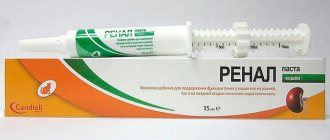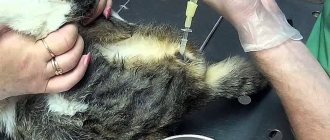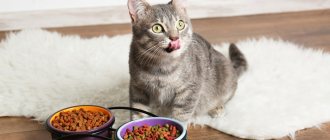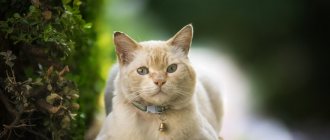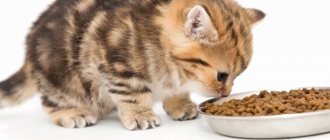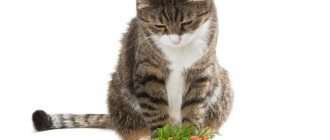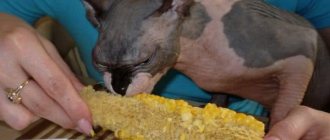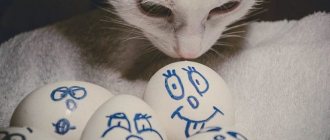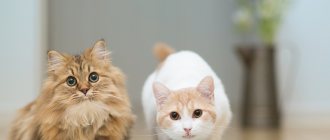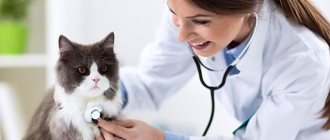| Place | Name | Characteristics in the rating |
| Top 5 best medicinal foods for cats |
| 1 | Hill's Prescription Diet | Best according to veterinarians |
| 2 | Monge VetSolution | For cats with sensitive digestion |
| 3 | Pro Plan Veterinary Diets | Wide range of medicinal foods |
| 4 | Advance Veterinary Diets | Best cast |
| 5 | Royal Canin | The most affordable |
Often, beloved pets get sick and need a special diet. In this case, the veterinarian recommends switching to special medicinal foods that will normalize the body’s functioning. And also improve well-being and, in combination with medications, promote recovery.
It is worth noting that this diet is prescribed for cats only by a veterinarian and you should not switch the animal to it yourself. Today, the highest quality veterinary foods are produced by the brands Hills, Monge, and Purina. We offer you a rating of the best, in our opinion, medicinal cat food in case your pet is sick and needs a special diet.
The most famous brands
One of the market leaders is Royal Canin. Interestingly, this brand of cat food originally appeared 50 years ago as food for shepherd dogs. The composition of the feed was developed by the French veterinarian J. Katari, and soon Royal Canin gained worldwide fame and also entered the elite of animal feeds.
Literally a few years after the company was registered, its owners began expanding production, and this is how a separate line of cat food appeared. Today, the French offer a whole series of medicinal foods for furry and hairless pets.
Royal Canin Sensible
The product with this label is intended for pets over 12 months of age who have digestive problems, particularly loose stools. The formula of the product allows it to be well absorbed by the digestive system even with intestinal hypersensitivity. This effect is achieved due to the LIP protein. In addition to all the benefits that such food brings to a sick pet, it also restores the natural intestinal microflora.
Royal Canin Light
This product is offered to those cats who have problems with extra pounds. The secret of the dietary composition lies in the fiber content, primarily plantain. So, with a sufficiently high nutritional value, the food contains almost a fifth less calories. At the same time, an increased proportion of protein ingredients has a beneficial effect on the muscle structure of the animal. And L-carnitine will allow the cat’s body to break down excess fats.
Sensitivity Control
A product with this name is intended for cats with one of several pathologies. It can be used for diarrhea, inflamed intestines, and intolerance to certain components usually added to animal feed. But the main purpose of the product is cases of allergies in cats. The complex is based on the following principles:
- improving the protective properties of the skin;
- preventing the development of urinary tract diseases;
- sufficient intake of proteins into the body;
- saturation of mucous areas with nutrients.
In addition to being intended for sick cats, Royal Canin's Sensitivity Control is also great for kittens thanks to its combination of ingredients.
Another well-known brand of dietary food for cats is Hill's. As in most similar cases, the idea of creating a product belongs to a veterinarian. In particular, Hill's was founded by M. Morris, who at that time, in the 1920s, worked at the animal hospital he founded in Edison, New Jersey.
During his practice, the veterinarian became convinced that most diseases in cats develop due to poor quality and improper nutrition. Trying to help his patients, Morris developed several formulas of therapeutic nutrition, which he gave to his patients until they recovered.
Today, Hill's is one of the world leaders in cat food sales. A special line of their products is designed for sick pets.
Diet Feline
This food is given to obese cats or animals with diabetes. The special formula minimizes the content of sugars and carbohydrates, which are contraindicated for cats suffering from these diseases.
The composition of the feed contains:
- proteins;
- chicken meat;
- turkey;
- rice.
This formula reduces the symptoms of diabetes and allows the body to accept insulin less painfully. Another additional effect of consuming Diet Feline is the improvement of the animal’s immunity.
PD Feline
This food is recommended by veterinarians as a restorative measure after an illness of internal organs. The beneficial effect is achieved due to the composition of the product:
- fatty acids;
- amino acids;
- antioxidants;
- lean chicken varieties;
- chicken eggs;
- beets, rice and other easily digestible grains and vegetables.
Therapeutic food not only strengthens the condition of the recovering body, but also removes toxins.
Prescription Diet Feline
This food is given to cats with liver diseases. Dry granular elements in the composition improve the functioning of a vital organ. Moreover, the formula does not contain sodium and protein ingredients, which again has a good effect on the condition of the liver. Additionally, vitamins and antioxidants improve the health of the entire body.
Feline Adult for sensitive skin
This product is intended for cats with sore or sensitive skin. It is also recommended for cats with long hair, as antioxidants and fatty acids, as well as oils and vitamin-containing additives in the composition, have a beneficial effect on the animal’s hair. A distinctive feature of the composition is the presence of exclusively natural ingredients: 40% of the feed is meat and 50% is by-products.
One of the three most prominent luxury cat food brands is undoubtedly Purina. The company was first registered at the end of the 19th century in the United States of America, and even then it specialized in medicinal feed.
Veterinarians recommend Purina brand products if your cat suffers from kidney and pen infections, as well as urolithiasis. The beneficial effect of the food is based on a precisely selected dosage of the necessary microelements for dietary nutrition:
- proteins;
- vitamins, especially C and D;
- colostrum;
- amino acids;
- docosahexaenoic acid and so on.
The form in which beneficial substances are offered to a sick cat is chosen so that the animal spends a minimum of energy on the breakdown of these microelements and the digestion process itself does not injure the affected organs.
Basic rules for feeding a cat during exhaustion
An exhausted cat needs nutritional therapy. You need to feed her exclusively in small portions (no more than 20 g per meal), every 3 hours. The serving size depends on the condition of the pet. Food should be easily absorbed by the body and have high energy value.
Important: an emaciated cat is fed in very small portions of 15–20 g every 3–4 hours.
Products for feeding need to be crushed. A cat in a state of exhaustion does not have enough strength to chew large and tough pieces of food. For this reason, she may refuse to eat.
Feeding pregnant cats
Feeding malnourished cats
Feeding obese cats
For kittens, food is ground in a blender; for adult pets, it is enough to chop it very finely.
Manufacturers
The manufacturer Hill's has special food for animals with digestive problems.
Medicinal food for cats with diseases of the gastrointestinal tract, liver and kidneys is produced by companies specializing in veterinary cat nutrition and premium diets. The production technology does not involve the use of preservatives and low-quality additives, so companies that produce cheap products in the economy segment are not in business. The best food is produced by the following companies:
- Hill's;
- Purina;
- Royal Canin;
- Monge VetSolution;
- Farmina Vet Life.
Natural products for cat exhaustion
The products from our table are not suitable for dietary therapy of cats with cachexia (moreover, such food is not suitable even for healthy animals). Our food may contain sugar, salt, spices, smoked meats, and dyes that are contraindicated for cats.
The cat must drink water. If she refuses to drink for more than a day, it is necessary to carefully pour in some water with a teaspoon. This must be done very carefully, no more than two teaspoons at a time, every hour (until the cat starts drinking on its own).
In the first days of the diet, it is best to give your cat a light broth of white chicken meat and a little chopped boiled chicken breast. At night you can give about 2 tbsp. l. low-fat kefir. It is better not to feed raw meat yet; it takes much longer to digest.
On the third day of the diet, you need to start introducing other foods. Below is a list of approved foods for nutritional therapy for emaciated cats.
20 approved foods for malnourished cats:
- Boiled chicken breast.
- Raw beef meat, deveined.
- Turkey raw and boiled.
- Boiled beef.
- Boiled lamb meat.
- Boiled rabbit.
- A small amount of raw beef liver (a lot of liver acts as a laxative).
- Rice water.
- Raw chicken egg.
- Raw quail egg.
- Light chicken broth.
- Boiled sea fish.
- Boiled beef heart (minced).
- Low-fat kefir.
- Cottage cheese with low fat content.
- Sour cream (up to 15% fat content).
- Classic yogurt, without sugar and fruit fillers.
- Buckwheat (as a complement to meat).
- Rice cereal (as an addition to meat).
- Ready-made canned meat baby food.
All foods should be fresh, at room temperature or slightly warmer. For the first few days of diet therapy, portions should be very small, feeding approximately 5–6 times a day, 20 g each. Then portions and breaks between feedings can be increased.
Sour cream and cottage cheese are on the list of allowed foods, but you should not give them more than once a day. Raw yolk is always recommended for weakened, sick, post-operative pets. It is best to mix it with cottage cheese or boiled meat.
Listed below are foods that should not be included in a cat's diet. They are especially dangerous for weakened animals.
20 foods prohibited for feeding cats:
- Raw pork.
- Lard (in any form).
- Sausages.
- River fish.
- Bones.
- Chicken heads, paws, skins.
- Flour products.
- Smoked meats.
- Milk.
- Salt.
- Sugar.
- Spices.
- Starch.
- Onions in raw or heat-treated form.
- Green onions in any form.
- Condensed milk (often bred for kittens).
- Yeast dough.
- Tomato paste (primarily this applies to those who like to feed their cats sprat in tomato).
- Cabbage (provokes flatulence).
- Legumes.
How to give?
Medicinal dry food for cats and dietary wet canned food, pates are prescribed by the doctor. For sick pets, feeding a special diet should be constant. Animals that have been diagnosed with a predisposition to diseases of the gastrointestinal tract, liver, and kidneys are allowed to mix dietary food with premium, holistic and super-premium food. It is not recommended to give antibiotic tablets to cats along with diet food, but herbal medicines will perfectly complement the diet. The feeding schedule and portion sizes are selected by the veterinarian; without any instructions, it is recommended to adhere to the norms indicated on the packaging.
Canned food for cats with digestive disorders and a tendency to food allergies is suitable for adult animals; it is better to give pates to kittens and elderly pets. Dry food must be washed down with water. For weakened and sick pets, special water is used for feeding cats, which can be purchased at a veterinary pharmacy along with food.
